|
|
|
Sort Order |
|
|
|
Items / Page
|
|
|
|
|
|
|
| Srl | Item |
| 1 |
ID:
180568
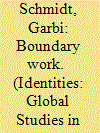

|
|
|
|
|
| Summary/Abstract |
Theoretically, this article investigates the politicisation of migration research in relation to boundary work between different spheres of the Danish public debate about migration, including research, media and politics. Empirically, the article analyses the roles that Danish migration researchers have played in such debates over the last two decades. Besides, the article presents and analyses results from a survey among migration researchers employed in four of Denmark’s six universities. The survey showed that while the majority of respondents did not feel unsafe participating in the public debate about migration, more than two out of five did. Jeopardising one’s professional reputation appeared to be a major concern. The article ends with a discussion of the survey results in relation to academic boundary work and presents suggestions for the road ahead, both for individual researchers and academic institutions.
|
|
|
|
|
|
|
|
|
|
|
|
|
|
|
|
| 2 |
ID:
180571


|
|
|
|
|
| Summary/Abstract |
This paper looks at how research communication in Norwegian migration and diversity research has changed over time. The main themes in the analysis are researchers’ motivations to enter the field and their experiences of, and reactions to, critique from colleagues and other audiences. Theory about credibility contests and boundary work on the interface of the academia and media, along with ideas about explicit and implicit normativity, inform the analysis. A main conclusion is that, as the field has matured, contests over normativity have changed from internal contests over implicit normativity to external charges of explicit normativity. The empirical analysis builds on 31 interviews with Norwegian researchers about their experiences of, and views on, public research communication in newspapers, social media, radio, TV and face-to-face panel debates. The interviewed researchers are of different age, gender, and ethnicity and they work in 10 different universities and research institutes across Norway.
|
|
|
|
|
|
|
|
|
|
|
|
|
|
|
|
| 3 |
ID:
192177
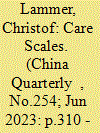

|
|
|
|
|
| Summary/Abstract |
Examining the “world's largest cash-based social policy” through the lens of care reveals widely shared scalar imaginaries and the productivity of care in constituting scale. In standardizing the minimum livelihood guarantee (dibao), officials, applicants and researchers in rural Sichuan cited both “too much” and “not enough” care at the scale of the family in recommending or rejecting state assistance. Different levels of organization (scale1) were not stable bases with specific sizes and qualities (scale2) that enabled or limited care. Dibao-related practices were evaluated as an appropriate (“filial piety”), insufficient (“individualism”) or excessive (“corruption”) amount of family care. Care became an indicator of kinship measurements and a marker of state boundaries. Thus, scale (in both meanings) was enacted in China, as elsewhere, through negotiations of needs and responsibilities, through evaluations of care practices and their outcomes. In this sense, care scales.
|
|
|
|
|
|
|
|
|
|
|
|
|
|
|
|
| 4 |
ID:
182456


|
|
|
|
|
| Summary/Abstract |
Despite best hopes of social and urban transformation, Johannesburg’s middle-class suburbs have remained largely inaccessible to lower income and more marginalised communities. This article examines the everyday practices and repertoires of action by resident associations in Johannesburg, demonstrating their ability to moderate more progressive state impulses and other land use changes. It argues that resident associations have become the custodians of middle-class visions and aesthetics and carry out the boundary work and symbolic violence that maintains and defends suburban borders.
|
|
|
|
|
|
|
|
|
|
|
|
|
|
|
|
| 5 |
ID:
167642
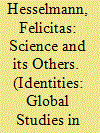

|
|
|
|
|
| Summary/Abstract |
This article investigates the current discourse about scientific misconduct from a postcolonial perspective. It traces the development of a causal story about scientific misconduct, blaming misconduct on so-called foreign scientific cultures said to be most prevalent among developing countries. The paper attempts to show how the discourse on misconduct is structured by themes and logics of coloniality as well as diverges from them, exhibiting shifting categorisations and images of the Other, which oscillate between the Other as a backwards savage and the Other as an advanced machine. Such contradictory categorisations will be argued to be both interpretable as movements to abandon prevailing ideologies of efficiency and progress within science and to make science more inclusive as well as means to uphold and re-establish existing patterns of coloniality in the face of historical changes both within and outside of academic research.
|
|
|
|
|
|
|
|
|
|
|
|
|
|
|
|
| 6 |
ID:
181637
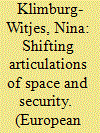

|
|
|
|
|
| Summary/Abstract |
European space policy is currently at a watershed. In 2021, there will be two institutions responsible for European space activities: The EU Space Agency (EU SPA) and the civilian European Space Agency (ESA) founded in 1975. This article investigates how new objectives and governance scheme(s) of European space activities reflect the increasing securitisation of space in Europe. Linking work in critical security studies to the concept of boundary work from science and technology studies (STS) I outline three phases of boundary work – expansion, expulsion and protection of autonomy – that all show how the dividing lines between peaceful and militarised space activities have become increasingly blurred. The conclusion argues that we currently witness a shift in the visions of European integration in space, with ESA remaining outside the EU framework and open to non-EU members while the EU SPA is accessible to EU members only and explicitly dedicated to the use of space for security. As the strategic potential of outer space is likely to grow, the paper offers a critical empirical investigation of the ongoing transformation in European space policy that has significant consequences for how we envision a “united Europe in space”.
|
|
|
|
|
|
|
|
|
|
|
|
|
|
|
|
| 7 |
ID:
120907
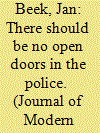

|
|
|
|
|
| Publication |
2012.
|
| Summary/Abstract |
In criminal investigations by police officers in northern Ghana, the lines are fluid: civilians arrest suspects on their own, assuming the tasks of the police. Police officers are heavily influenced by civilians, often forming paid alliances with them. Yet such entanglements paradoxically enable state policing and integrate the police into society in a context of low resources and low legitimacy. Other practices limit and frame such transgressions. Using the concept of boundary work, this article analyses how actors maintain and negotiate the seemingly blurred distinction between state and society in West Africa.
|
|
|
|
|
|
|
|
|
|
|
|
|
|
|
|
|
|
|
|
|